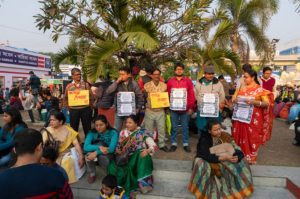West Bengal Teacher Recruitment Scandal: The West Bengal teacher recruitment scam has recently emerged as one of the most contentious and high-profile issues in the state, drawing widespread attention from the public, the media, and political circles alike. This unfolding controversy has escalated into a series of complex legal battles and intense political confrontations, with far-reaching implications for the state’s educational framework, governance, and the broader democratic process. At the heart of the issue lies a deep concern over transparency, accountability, and the integrity of public institutions—particularly in how recruitment for government positions is managed.
The scandal has not only raised serious questions about the legitimacy of the hiring process but has also sparked a wave of protests, court cases, and political rhetoric that continues to dominate the public discourse. This comprehensive and detailed analysis aims to explore the origins of the scam, tracing how it first came to light and unraveling the systemic failures that allowed it to persist.
Additionally, it examines the pivotal judicial interventions that have reshaped the narrative, the significant political ramifications involving high-profile leaders and parties, and the broader social and administrative consequences faced by thousands of affected stakeholders, including job aspirants, educators, and government institutions. Through this examination, we aim to understand the scope and gravity of the scam, and what it reveals about the current state of governance in West Bengal.
West Bengal Teacher Recruitment Scandal: Origins and Unraveling of the Scam
The roots of the West Bengal teacher recruitment scam can be traced back to the State Level Selection Test (SLST) conducted in the year 2016, which was intended to fill vacancies for teachers in government-sponsored and government-aided secondary and higher secondary schools across the state. This examination was a significant recruitment drive, with more than 23 lakh aspiring candidates appearing for a total of approximately 24,640 available posts. These positions were highly sought-after due to the job security, social prestige, and long-term career benefits associated with employment in the public education sector.
However, soon after the publication of results and subsequent appointments, widespread allegations of malpractice and administrative irregularities began to surface. Whistleblowers, unsuccessful candidates, and certain activists claimed that the selection process had been deeply compromised by corruption, favoritism, and political interference. Reports began circulating that appointments had been made not only beyond the sanctioned number of posts but also after the official recruitment panel had expired—rendering those recruitments technically invalid under existing service rules and regulations.
As more individuals began to question the legitimacy of the appointments, evidence gradually came to light indicating that the recruitment process may have been systematically manipulated to favor certain individuals, allegedly in exchange for bribes or political loyalty. There were instances where candidates with lower marks were selected over higher-scoring individuals, and others where blank or tampered OMR sheets were allegedly submitted on behalf of favored applicants. Such revelations deeply eroded public trust in the integrity of the recruitment process and sparked a wave of protests, legal petitions, and demands for an impartial investigation.
These allegations, taken together, painted a disturbing picture of a systemic failure where meritocracy was allegedly sidelined in favor of personal gain and political patronage. The scandal called into question the mechanisms of oversight and accountability within the School Service Commission (SSC) and the broader administrative apparatus tasked with ensuring fairness and transparency in public sector recruitment.
West Bengal Teacher Recruitment Scandal: Judicial Interventions and Findings
In light of the growing public outrage and the increasing number of legal complaints surrounding the teacher recruitment process in West Bengal, the Calcutta High Court took suo motu cognizance and initiated a comprehensive judicial review of the entire selection process associated with the State Level Selection Test (SLST) conducted in 2016. As the case progressed, multiple petitions were filed by aggrieved candidates, alleging large-scale irregularities, manipulation of marks, favoritism, and backdoor appointments. The sheer volume and gravity of the complaints prompted the court to subject the recruitment process to intense legal scrutiny, involving the examination of official records, mark sheets, appointment lists, and the timelines of the panel’s validity.
After months of hearings, on April 22, 2024, a division bench of the Calcutta High Court delivered a landmark judgment that sent shockwaves through the state’s education and political establishments. The bench declared the entire selection process under SLST-2016 to be “null and void,” thereby annulling all the appointments that had been made through that recruitment cycle. The decision impacted thousands of teaching and non-teaching staff who had been serving in government and government-aided schools since their appointment. The court noted that not only had appointments been made beyond the officially sanctioned number of vacancies, but many of these had occurred after the expiration of the recruitment panel, which made them patently illegal.
In addition to scrapping the appointments, the court issued strict directives to the West Bengal School Service Commission (WBSSC), instructing it to initiate an entirely new and transparent recruitment process.
The court emphasized that the new process should prioritize transparency, merit, and compliance with constitutional provisions to restore public faith in the system. Simultaneously, recognizing the possibility of criminal intent and organized fraud, the bench handed over the case to the Central Bureau of Investigation (CBI), one of India’s premier investigative agencies. The CBI was ordered to conduct a thorough and impartial investigation into the entire appointment process and to submit its findings to the court within three months. This move underscored the seriousness with which the judiciary was treating the allegations and its intent to ensure justice not just administratively but also criminally, where appropriate.
The court’s remarks during the judgment were particularly scathing and uncompromising. It invoked Articles 14 and 16 of the Constitution of India, which guarantee equality before the law and prohibit discrimination in matters of public employment, respectively. The bench expressed grave concern that such widespread irregularities could not have taken place without the active involvement or, at the very least, the tacit approval of powerful individuals in the administrative and political hierarchy. The judges remarked that the nature of the fraud indicated a deeply entrenched nexus between those in charge of conducting the recruitment and individuals who stood to benefit from manipulating the process.
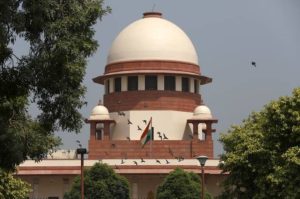

In a move that further underlined the accountability aspect, the court directed all individuals who had received appointments through fraudulent or irregular means to return the salaries, emoluments, and any other financial benefits they had earned during their tenure. Moreover, they were instructed to repay these amounts with an annual interest rate of 12%, calculated from the date of appointment to the date of repayment. This directive was seen as a strong deterrent against future malpractice and as a means of recovering public funds that had been wrongfully disbursed.
The verdict was not only a judicial pronouncement but also a powerful commentary on the systemic failures in recruitment governance. It sent a clear message that public sector corruption would not be tolerated and that the judiciary would act decisively to uphold constitutional principles and safeguard the rights of meritorious candidates who were denied their fair opportunity due to corrupt practices.
West Bengal Teacher Recruitment Scandal: Political Repercussions and Calls for Accountability
The Calcutta High Court’s sweeping judgment in the SLST-2016 teacher recruitment scam sent immediate and far-reaching shockwaves through the political establishment of West Bengal, particularly shaking the foundations of the ruling Trinamool Congress (TMC) government. The implications of the verdict were not limited to administrative corrections—it sparked a fierce political firestorm, with opposition parties, especially the Bharatiya Janata Party (BJP), launching an all-out attack on the state government. The judgment, which effectively nullified the appointments of thousands of teachers and non-teaching staff, was interpreted by political opponents as a damning indictment of the Mamata Banerjee-led administration’s handling of public recruitment and governance.
The BJP, acting as the principal opposition force in the state, wasted no time in seizing upon the court’s verdict as a major political opportunity. Senior BJP leaders issued strong statements condemning the TMC and alleging that the court’s decision was the latest and clearest confirmation of what they described as a deeply entrenched culture of corruption, nepotism, and lawlessness under the TMC regime. The party accused the state government of exploiting the education system to favor its political sympathizers and loyalists, thereby undermining the aspirations of millions of qualified, unemployed youth in West Bengal.
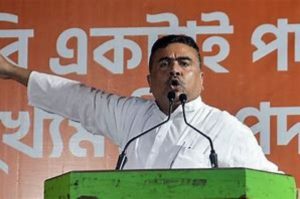

Suvendu Adhikari, the Leader of the Opposition in the West Bengal Legislative Assembly and a prominent BJP figure, held a press conference in which he described the High Court’s ruling as a “historic” and “landmark” decision. He stated that the verdict clearly exposed the involvement of top officials within the TMC government in orchestrating a large-scale scam that robbed deserving candidates of their rightful opportunities. Adhikari emphasized that this scandal was not an isolated administrative lapse but a symptom of systemic corruption that had flourished under Mamata Banerjee’s leadership. He demanded the immediate resignation of several top TMC officials and insisted that Chief Minister Mamata Banerjee herself should step down to allow for an impartial probe.
Meanwhile, Amit Malviya, the BJP’s co-in-charge for West Bengal, issued a scathing statement through social media and press briefings. He referred to the scam as the “biggest government-sponsored recruitment fraud in the country’s history,” adding that it had devastated the futures of countless youths who had studied, trained, and prepared for years in the hope of securing stable government jobs. Malviya alleged that the TMC had turned public recruitment into a commercial enterprise, where positions were effectively sold to the highest bidders or handed out as political favors, thus systematically dismantling the foundation of meritocracy.
On the national stage, BJP spokesperson Syed Zafar Islam intensified the political rhetoric by directly targeting Chief Minister Mamata Banerjee. He labeled her the “kingpin of the recruitment scam,” alleging that such a large-scale fraud could not have taken place without her knowledge or consent. He demanded her immediate resignation, asserting that the Calcutta High Court’s judgment had thoroughly ex
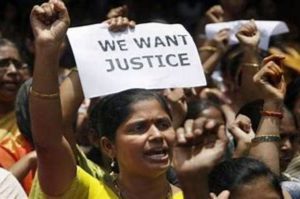

posed her complicity—either through direct involvement or by turning a blind eye to corrupt practices within her administration. According to him, the entire scandal reflected a complete breakdown of administrative integrity and moral responsibility at the highest levels of the state government.
Adding a unique and controversial dimension to the growing political storm was the response of former Calcutta High Court judge Abhijit Gangopadhyay, who had previously been involved in overseeing some of the early legal proceedings related to the teacher recruitment case. Now a BJP Lok Sabha candidate for the 2024 general elections, Gangopadhyay openly welcomed the High Court’s decision, calling it an appropriate and necessary corrective measure.
Drawing on his judicial background, he asserted that the ruling highlighted deep institutional failures that must be addressed urgently. He not only echoed the BJP’s call for Mamata Banerjee’s resignation but also demanded stringent legal action against all those who played a role in facilitating or covering up the scam. Gangopadhyay emphasized that those responsible—including senior bureaucrats, political figures, and commission officials—should face the full force of the law, including criminal charges where warranted.
The political fallout extended beyond statements and press conferences. Massive protests were organized by the BJP and other opposition groups across various districts of West Bengal, where party workers and aggrieved job seekers took to the streets demanding justice and immediate governmental accountability. Demonstrators carried placards, chanted slogans against the TMC leadership, and called for systemic reform in the education and recruitment sectors. These protests were often met with counter-demonstrations and denials from TMC supporters, further escalating political tensions across the state.
In summary, the High Court’s judgment acted as a political lightning rod, igniting fierce debates, protests, and high-stakes confrontations in West Bengal’s already polarized political environment. For the BJP, the recruitment scam became a potent symbol of everything they argue is wrong with the Mamata Banerjee government. It provided the opposition with a powerful electoral issue just ahead of the general elections, potentially reshaping the political landscape of the state and influencing voter sentiment in a substantial way.
West Bengal Teacher Recruitment Scandal: State Government’s Response and Defense
In the aftermath of the Calcutta High Court’s explosive verdict that nullified the SLST-2016 recruitment process, West Bengal Chief Minister Mamata Banerjee mounted a staunch and impassioned defense of her government’s role and intent. During multiple public addresses, media interactions, and political rallies, Banerjee decried the judgment as “politically motivated” and “legally untenable,” suggesting that the decision was part of a broader strategy aimed at discrediting her administration ahead of the general elections. She questioned the timing of the judgment, implying that it was deliberately released to inflict maximum political damage to the ruling Trinamool Congress (TMC) during a sensitive electoral period.
Mamata Banerjee went a step further, accusing senior BJP leaders of exerting undue influence over segments of the judiciary to orchestrate a verdict that would serve their political interests. She contended that the BJP had been consistently attempting to destabilize state governments led by opposition parties through central agencies, and this case, she argued, was yet another example of that pattern. According to her, the High Court’s decision was not merely a legal pronouncement but part of a larger conspiracy fueled by the BJP’s desire to capture power in West Bengal by any means necessary.
The Chief Minister expressed deep concern over the human consequences of the ruling, particularly for the thousands of individuals who had been summarily dismissed from their teaching and non-teaching posts. She described these individuals not as beneficiaries of corruption, but as “innocent victims” who had been caught in a political crossfire. Many of these appointees, she argued, had been serving in schools for years, contributing to the state’s education system, and should not be punished en masse without individualized scrutiny. Banerjee assured them that her government would provide full support—legal, financial, and emotional—and vowed to stand by every affected worker during this turbulent time.
As part of her government’s defense strategy, Mamata Banerjee announced that the state would file a special leave petition in the Supreme Court of India to challenge the High Court’s decision. She asserted that her legal team had strong grounds to question the constitutional and procedural aspects of the judgment, particularly the decision to cancel all appointments indiscriminately without any opportunity for the appointees to be heard. Her government maintained that while any instances of proven corruption should be dealt with harshly, blanket punishment of all recruits—regardless of whether they were genuinely qualified—was unjust and would result in irreparable harm.
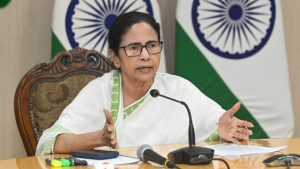

Additionally, Banerjee used the opportunity to question the role of former Justice Abhijit Gangopadhyay, who had previously been involved in the case and later joined the BJP as a candidate. She raised serious concerns about conflict of interest, claiming that the judgment was colored by political bias and motivated by Gangopadhyay’s electoral ambitions. According to Banerjee, this association blurred the lines between judicial neutrality and political activism, raising ethical questions about the integrity of the legal process in this high-profile case.
Despite the criticism, Mamata Banerjee’s response resonated with sections of the public and her party’s support base, many of whom viewed the verdict as an affront to state autonomy and democratic governance. She reiterated that the people of West Bengal would give a fitting response to such political maneuvers through the ballot box.
West Bengal Teacher Recruitment Scandal: Broader Implications and Stakeholder Impact
The Calcutta High Court’s verdict in the SLST-2016 scam is not merely a judicial order confined to the boundaries of a single recruitment cycle; it has far-reaching implications that ripple across the political, administrative, legal, and social landscapes of West Bengal. The consequences of the ruling touch the lives of thousands of individuals, reshape public opinion regarding institutional integrity, and compel both state and central agencies to reevaluate their oversight mechanisms.
For the more than 25,000 individuals whose appointments have now been declared void, the verdict represents a catastrophic personal and professional setback. Many of these individuals had been working in various schools across the state for several years, building careers, supporting families, and contributing to local communities.
The abrupt loss of employment has triggered widespread anxiety, financial insecurity, and a profound sense of injustice among them. These individuals now face the dual burden of not only losing their livelihoods but also being stigmatized as “illegal appointees,” despite the fact that many may have had no role in or awareness of any underlying corruption. For them, the path forward is uncertain, especially as the court has ordered the recovery of salaries paid over several years—along with interest—placing them under immense financial and emotional strain.
On the other side are the aggrieved candidates who had long alleged being denied fair opportunities due to manipulation and favoritism. For these individuals, the High Court’s decision comes as a long-awaited validation of their struggles. Many of them had filed petitions, staged protests, and fought legal battles for years in the hope of receiving justice. The judgment acknowledges their grievances and opens the door for a possible fresh recruitment process in which merit and transparency are genuinely upheld. Their faith in the legal system has been reinforced, although the path ahead—awaiting a new examination and selection—still demands patience and resilience.
Beyond the individual stakes, the ruling underscores the urgent need for systemic reform within the West Bengal School Service Commission (WBSSC) and similar state-level recruitment bodies. The exposure of widespread irregularities, favoritism, and procedural violations has cast a long shadow over public trust in recruitment mechanisms. The credibility of the SSC has been severely dented, and any future examination process will now be scrutinized under a microscope by candidates, the media, and oversight bodies alike.
In a broader governance context, the verdict has placed the spotlight on the role of central investigative agencies in probing state-level scandals. The court’s directive for a Central Bureau of Investigation (CBI) probe underscores the seriousness of the allegations and reflects a growing trend where the judiciary calls upon independent federal agencies to investigate potentially politicized or compromised state actions.
The CBI, known for handling complex and sensitive cases, has now been entrusted with the responsibility of uncovering the full extent of the malpractice and identifying those responsible for engineering or facilitating the fraud. If the investigation is conducted fairly and thoroughly, it could set a precedent for handling similar cases in other states and reinforce the idea that recruitment-related corruption will face strong legal consequences.
The ruling has also sparked wider conversations about the fairness of blanket punitive actions. Legal experts, civil society organizations, and teacher unions have raised important questions about the balance between rooting out corruption and protecting the rights of those who may have been innocently caught up in the system. Many argue that while systemic reform is essential, it must be accompanied by procedural fairness and safeguards that prevent the collateral damage of innocent lives.
In conclusion, the fallout from the SLST-2016 scam and the Calcutta High Court’s ruling is shaping up to be a defining chapter in West Bengal’s administrative and political history. It serves as a cautionary tale about the dangers of institutional corruption and the devastating human cost of compromised recruitment processes. It also offers a potential opportunity for systemic reform, if stakeholders across the political and administrative spectrum choose to act decisively, transparently, and in the public interest.
The West Bengal teacher recruitment scam has unveiled deep-seated issues within the state’s recruitment mechanisms, leading to significant legal and political upheavals. As the state government prepares to challenge the High Court’s decision in the Supreme Court, the outcome of this legal battle will be pivotal in shaping the future of public sector recruitment in West Bengal. It will also play a crucial role in determining the accountability of public officials and the integrity of governance in the state. The developments thus far highlight the intricate interplay between the judiciary and political entities, emphasizing the imperative for transparent and fair administrative practices.
DO FOLLOW:
Also read: Home | Channel 6 Network – Latest News, Breaking Updates: Politics, Business, Tech & More

